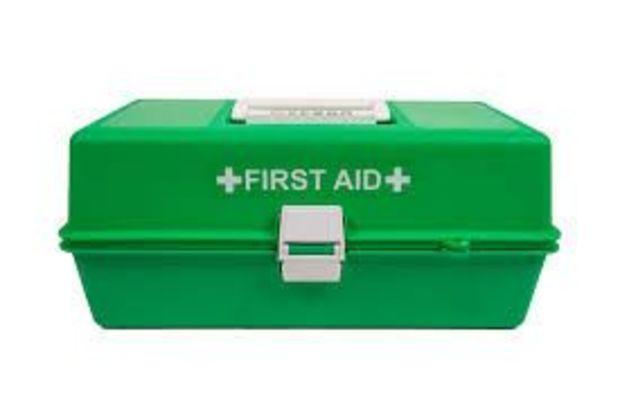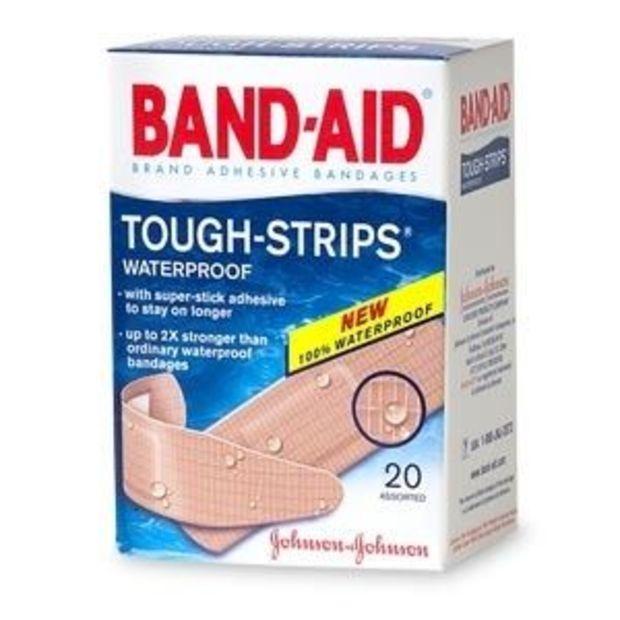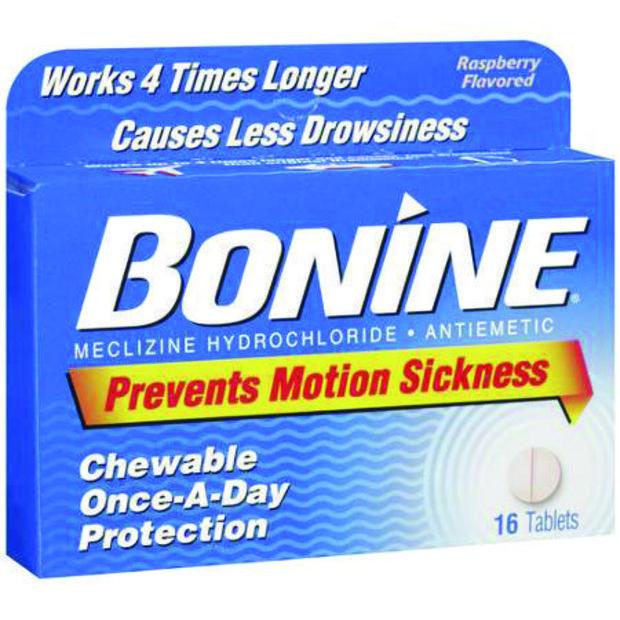
If there’s anything I loathe when fishing or hunting, it’s lack of preparation, especially on my part. Leaving the dock without your favorite lure is one thing, but quite another to forget essential safety gear. When fishing with others, one thing that really burns my shorts is an inadequate first-aid kit; worse, not having one at all.
I’d bet most of us have a sea story of a medical situation that could have turned out worse. This one is mild but makes the point. On a beautiful day in early autumn, fishing feather jigs to big perch and rockfish off the Bay Bridge’s eastern stone pile, an old timer was casting a swimming plug next to me. And when I say next to me I mean next to me, as in when he exhaled I could tell what he had eaten for breakfast.
After putting another slab perch in the box, I heard a string of muffled profanity from behind us. As I drifted past, I noticed the aforementioned lure dangling like a Christmas ornament from his hand, blood dripping like coffee from an urn.
“Do you need help?” I inquired. “Nope,” came the gruff reply, though simultaneously came a much milder plea of “yes.” The voice belonged to a woman sitting in a plastic lawn chair, his wife I assumed. She wanted to head in. He insisted they continue fishing.
After they had their “Mr. and Mrs. Moment,” and after I’d had enough of his moans, my bedside (or boatside) manner matched his attitude as a patient; I sidled along his gunwale and convinced him to at least let me cut off the lure and tape the treble so it wouldn’t swing and cause more damage. This was in the days before I got my Coast Guard license or had any advanced formal medical emergency training. But I had a med kit onboard, and he did not. He was using the napkin from his morning donut. The quick, temporary fix worked, and bizarrely he kept fishing another 15 minutes before the pain won out, forcing him to port.

Today, I have three prepared medical kits, four if you include the monster pack I keep at the house in event of natural or manmade calamities (I’m not yet a prepper but it does contain Meals Ready-to-Eat (MREs) and water purification tablets). The small kit has just the essentials, so it’s only for solo kayak and hunting jaunts. The second med kit I use for my guided trips and kids’ camps has enough supplies for six to eight people. The third I keep on my center console, per U.S. Coast Guard requirements, and it remains fully stocked in my gear shed. (I’m temporarily between boats at the moment, a sore subject really, so I’d prefer not to dwell on it.)
Here are some must-have medical supplies I suggest everyone carry in their kits:
- Band-Aids and non-stick dressings: two essentials. Butterfly strips are effective to keep lacerations closed.
Buy the waterproof kind.
- Disinfectants. Cleaning the wound is critical. Include both antiseptic solution/wipes and antibiotic ointment.
- Scissors and tweezers. Using a knife to cut away clothing or make bandage strips is clumsy. Scissors are best, and a good pair of tweezers can pull out everything from fish barbs to hooks.
- Gloves, mask, and bags. The first tenet of dealing with an emergency is don’t recklessly put yourself at risk. Mask and gloves protect you from bodily fluids and possible communicable disease. Barf bags work not only for those afflicted by mal de mer but for the rest of us prone to sympathetic puking.
- Tape. I keep three kinds of tape handy: medical (waterproof), duct, and electrical. Great for securing all kinds of things.
- Pain and seasickness meds. Use as directed, helpful to mitigate pain due to injury.
- Saline solution or sterile eyewash.
- Bandages and splints. Slipping on deck can twist an ankle, or worse. Stabilizing the injury en route to professional care can calm the injured.

Buying a first aid kit is the easiest solution and worth the investment. You can pick a basic kit up from your local drugstore. If you need a more advanced kit, for long trips and/or where immediate medical help is hours away, bump up to a large kit, which most marine supply stores carry, or you can purchase online. At least once a season (I count four seasons), go through your medical kit and restock any expired or used supplies. If you haven’t already, it’s a good idea to get First Aid and CPR certified.
Giving short shrift to a first-aid kit is not only a sign of poor seamanship, but it’s also irresponsible and invites the potential to turn a manageable injury into a severe situation. You’re better than that.
Some Dos and Don'ts:
- Do politely and discreetly ask your passengers, even family members, if they have medical conditions you need to be aware of. Are they on medication? Are they allergic to anything? And if so, do they carry an Epi-Pen?
- Don't give teens and children aspirin, as it has been linked, albeit rarely, to Reye's syndrome, a serious disease that affects children younger than 18 years old.
- Do inform your fishing buddies and guests where to keep the First Aid Kit.
- Don't ignore a nick, cut, or stab from a hook, fish, or other source, no matter how small. Tend to it immediately. Vibrio is nasty.
 If there’s anything I loathe when fishing or hunting, it’s lack of preparation, especially on my part. Leaving the dock without your favorite lure is one thing, but quite another to forget essential safety gear. When fishing with others, one thing that really burns my shorts is an inadequate first-aid kit; worse, not having one at all.
I’d bet most of us have a sea story of a medical situation that could have turned out worse. This one is mild but makes the point. On a beautiful day in early autumn, fishing feather jigs to big perch and rockfish off the Bay Bridge’s eastern stone pile, an old timer was casting a swimming plug next to me. And when I say next to me I mean next to me, as in when he exhaled I could tell what he had eaten for breakfast.
After putting another slab perch in the box, I heard a string of muffled profanity from behind us. As I drifted past, I noticed the aforementioned lure dangling like a Christmas ornament from his hand, blood dripping like coffee from an urn.
“Do you need help?” I inquired. “Nope,” came the gruff reply, though simultaneously came a much milder plea of “yes.” The voice belonged to a woman sitting in a plastic lawn chair, his wife I assumed. She wanted to head in. He insisted they continue fishing.
After they had their “Mr. and Mrs. Moment,” and after I’d had enough of his moans, my bedside (or boatside) manner matched his attitude as a patient; I sidled along his gunwale and convinced him to at least let me cut off the lure and tape the treble so it wouldn’t swing and cause more damage. This was in the days before I got my Coast Guard license or had any advanced formal medical emergency training. But I had a med kit onboard, and he did not. He was using the napkin from his morning donut. The quick, temporary fix worked, and bizarrely he kept fishing another 15 minutes before the pain won out, forcing him to port.
If there’s anything I loathe when fishing or hunting, it’s lack of preparation, especially on my part. Leaving the dock without your favorite lure is one thing, but quite another to forget essential safety gear. When fishing with others, one thing that really burns my shorts is an inadequate first-aid kit; worse, not having one at all.
I’d bet most of us have a sea story of a medical situation that could have turned out worse. This one is mild but makes the point. On a beautiful day in early autumn, fishing feather jigs to big perch and rockfish off the Bay Bridge’s eastern stone pile, an old timer was casting a swimming plug next to me. And when I say next to me I mean next to me, as in when he exhaled I could tell what he had eaten for breakfast.
After putting another slab perch in the box, I heard a string of muffled profanity from behind us. As I drifted past, I noticed the aforementioned lure dangling like a Christmas ornament from his hand, blood dripping like coffee from an urn.
“Do you need help?” I inquired. “Nope,” came the gruff reply, though simultaneously came a much milder plea of “yes.” The voice belonged to a woman sitting in a plastic lawn chair, his wife I assumed. She wanted to head in. He insisted they continue fishing.
After they had their “Mr. and Mrs. Moment,” and after I’d had enough of his moans, my bedside (or boatside) manner matched his attitude as a patient; I sidled along his gunwale and convinced him to at least let me cut off the lure and tape the treble so it wouldn’t swing and cause more damage. This was in the days before I got my Coast Guard license or had any advanced formal medical emergency training. But I had a med kit onboard, and he did not. He was using the napkin from his morning donut. The quick, temporary fix worked, and bizarrely he kept fishing another 15 minutes before the pain won out, forcing him to port.
 Today, I have three prepared medical kits, four if you include the monster pack I keep at the house in event of natural or manmade calamities (I’m not yet a prepper but it does contain Meals Ready-to-Eat (MREs) and water purification tablets). The small kit has just the essentials, so it’s only for solo kayak and hunting jaunts. The second med kit I use for my guided trips and kids’ camps has enough supplies for six to eight people. The third I keep on my center console, per U.S. Coast Guard requirements, and it remains fully stocked in my gear shed. (I’m temporarily between boats at the moment, a sore subject really, so I’d prefer not to dwell on it.)
Here are some must-have medical supplies I suggest everyone carry in their kits:
Today, I have three prepared medical kits, four if you include the monster pack I keep at the house in event of natural or manmade calamities (I’m not yet a prepper but it does contain Meals Ready-to-Eat (MREs) and water purification tablets). The small kit has just the essentials, so it’s only for solo kayak and hunting jaunts. The second med kit I use for my guided trips and kids’ camps has enough supplies for six to eight people. The third I keep on my center console, per U.S. Coast Guard requirements, and it remains fully stocked in my gear shed. (I’m temporarily between boats at the moment, a sore subject really, so I’d prefer not to dwell on it.)
Here are some must-have medical supplies I suggest everyone carry in their kits:
 Buying a first aid kit is the easiest solution and worth the investment. You can pick a basic kit up from your local drugstore. If you need a more advanced kit, for long trips and/or where immediate medical help is hours away, bump up to a large kit, which most marine supply stores carry, or you can purchase online. At least once a season (I count four seasons), go through your medical kit and restock any expired or used supplies. If you haven’t already, it’s a good idea to get First Aid and CPR certified.
Giving short shrift to a first-aid kit is not only a sign of poor seamanship, but it’s also irresponsible and invites the potential to turn a manageable injury into a severe situation. You’re better than that.
Some Dos and Don'ts:
Buying a first aid kit is the easiest solution and worth the investment. You can pick a basic kit up from your local drugstore. If you need a more advanced kit, for long trips and/or where immediate medical help is hours away, bump up to a large kit, which most marine supply stores carry, or you can purchase online. At least once a season (I count four seasons), go through your medical kit and restock any expired or used supplies. If you haven’t already, it’s a good idea to get First Aid and CPR certified.
Giving short shrift to a first-aid kit is not only a sign of poor seamanship, but it’s also irresponsible and invites the potential to turn a manageable injury into a severe situation. You’re better than that.
Some Dos and Don'ts: